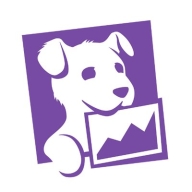

Datadog and Azure Bastion are both major players in the cloud services category, focusing on monitoring and security, respectively. Datadog has the upper hand in infrastructure management and integration flexibility, while Azure Bastion excels in providing secure remote access without public IP exposure.
Features: Datadog offers extensive integrations and shareable dashboards, making it easy to visualize and monitor metrics across various platforms. It is hosted, eliminating infrastructure management worries and includes API, Slack integration, and anomaly detection features. Azure Bastion provides secure and seamless access to resources without needing public IPs, focusing on secure RDP and SSH access in the cloud.
Room for Improvement: Datadog's pricing model is complex and could benefit from better cost control. Users seek more consistency in APIs and improved technical support. Azure Bastion could enhance its data transfer capabilities between desktops and improve its protocol speed. Compatibility with browsers other than Edge could also be improved.
Ease of Deployment and Customer Service: Datadog supports private, public, and hybrid clouds, offering a broad adaptability spectrum, whereas Azure Bastion primarily supports public cloud deployment. Datadog's customer service is proactive, though sometimes inconsistent, while Azure Bastion provides very good support with potential improvements in response speed.
Pricing and ROI: Datadog's usage-based pricing can lead to unexpected costs but provides a high ROI through time savings and operational efficiency. Azure Bastion's competitive pricing highlights security benefits but includes data retrieval charges. Both offer ROI through enhanced security and streamlined operations but cater to different organizational sizes and needs.
We have noticed savings of approximately twenty percent by using Azure Bastion compared to VM pricing.
Previously we had thirteen contractors doing the monitoring for us, which is now reduced to only five.
Datadog has delivered more than its value through reduced downtime, faster recovery, and infrastructure optimization.
I believe features that would provide a lot of time savings, just enabling you to really narrow down and filter the type of frustration or user interaction that you're looking for.
We usually get backup within two hours.
Support is satisfactory but with room for improvement, primarily concerning data transfer issues.
When I have additional questions, the ticket is updated with actual recommendations or suggestions pointing me in the correct direction.
Overall, the entire Datadog comprehensive experience of support, onboarding, getting everything in there, and having a good line of feedback has been exceptional.
I've had a couple instances where I reached out to Datadog's support team, and they have been really super helpful and very kind, even reaching back out after resolving my issues to check if everything's going well.
It is designed to provide access over a private network without hitting the internet.
Datadog's scalability has been great as it has been able to grow with our needs.
We did, as a trial, engage the AWS integration, and immediately it found all of our AWS resources and presented them to us.
Datadog's scalability is strong; we've continued to significantly grow our software, and there are processes in place to ensure that as new servers, realms, and environments are introduced, we're able to include them all in Datadog without noticing any performance issues.
Azure Bastion is stable.
Datadog is very stable, as there hasn't been any downtime or issues since I've been here, and it's always on time.
Datadog seems stable in my experience without any downtime or reliability issues.
Datadog seems to be more stable, and I really want to have a complete demo before making a call to decide on this.
I would like to see integrated AI features with Azure Bastion, especially for connectivity issues.
A storage solution must be created to transfer data, and this requires additional permissions like ACL or NFS.
It would be nice to have the capability to cut and paste across desktops, similar to old-fashioned Remote Desktop emulation.
It would be great to see stronger AI-driven anomaly detection and predictive analytics to help identify potential issues before they impact performance.
We want to be able to customize the cost part, and we would appreciate more granular access control.
The documentation is adequate, but team members coming into a project could benefit from more guided, interactive tutorials, ideally leveraging real-world data.
Microsoft's pricing is on the higher side and could be more competitive.
The price is not necessarily cheaper, but it is acceptable.
The setup cost for Datadog is more than $100.
Everybody wants the agent installed, but we only have so many dollars to spread across, so it's been difficult for me to prioritize who will benefit from Datadog at this time.
My experience with pricing, setup cost, and licensing is that it is really expensive.
The most valuable feature of Azure Bastion is its security, which I find to be the best part.
The security is the main reason we use Azure Bastion because it is integrated with Azure Active Directory, ensuring that access is secure.
Azure Bastion eliminates the need for a jump server by providing secure access to servers without hitting the public network.
Our architecture is written in several languages, and one area where Datadog particularly shines is in providing first-class support for a multitude of programming languages.
Having all that associated analytics helps me in troubleshooting by not having to bounce around to other tools, which saves me a lot of time.
Datadog was able to find the alerts and trigger to notify our team in a very prompt manner before it got worse, allowing us to promptly adjust and remediate the situation in time.
| Product | Market Share (%) |
|---|---|
| Datadog | 2.4% |
| Azure Bastion | 0.4% |
| Other | 97.2% |

| Company Size | Count |
|---|---|
| Small Business | 5 |
| Midsize Enterprise | 1 |
| Large Enterprise | 6 |
| Company Size | Count |
|---|---|
| Small Business | 80 |
| Midsize Enterprise | 46 |
| Large Enterprise | 99 |
Azure Bastion is a service you deploy that lets you connect to a virtual machine using your browser and the Azure portal. The Azure Bastion service is a fully platform-managed PaaS service that you provision inside your virtual network. It provides secure and seamless RDP/SSH connectivity to your virtual machines directly from the Azure portal over TLS. When you connect via Azure Bastion, your virtual machines do not need a public IP address, agent, or special client software.
Datadog integrates extensive monitoring solutions with features like customizable dashboards and real-time alerting, supporting efficient system management. Its seamless integration capabilities with tools like AWS and Slack make it a critical part of cloud infrastructure monitoring.
Datadog offers centralized logging and monitoring, making troubleshooting fast and efficient. It facilitates performance tracking in cloud environments such as AWS and Azure, utilizing tools like EC2 and APM for service management. Custom metrics and alerts improve the ability to respond to issues swiftly, while real-time tools enhance system responsiveness. However, users express the need for improved query performance, a more intuitive UI, and increased integration capabilities. Concerns about the pricing model's complexity have led to calls for greater transparency and control, and additional advanced customization options are sought. Datadog's implementation requires attention to these aspects, with enhanced documentation and onboarding recommended to reduce the learning curve.
What are Datadog's Key Features?In industries like finance and technology, Datadog is implemented for its monitoring capabilities across cloud architectures. Its ability to aggregate logs and provide a unified view enhances reliability in environments demanding high performance. By leveraging real-time insights and integration with platforms like AWS and Azure, organizations in these sectors efficiently manage their cloud infrastructures, ensuring optimal performance and proactive issue resolution.
We monitor all Network Monitoring Software reviews to prevent fraudulent reviews and keep review quality high. We do not post reviews by company employees or direct competitors. We validate each review for authenticity via cross-reference with LinkedIn, and personal follow-up with the reviewer when necessary.